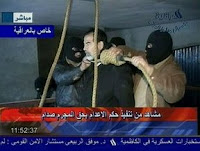 The British newspaper The Independent published an article by Robert Fisk about the execution of Saddam Husayn - He takes his secrets to the grave. Our complicity dies with him.
The British newspaper The Independent published an article by Robert Fisk about the execution of Saddam Husayn - He takes his secrets to the grave. Our complicity dies with him.
Earlier this year, Fisk reported on what I allegedly reported to Washington after touring the battlefields on the Al-Faw peninsula shortly after Iraqi forces had retaken them from Iranian troops. In that piece, he got it wrong - read my response to that earlier article.
This current article is slightly more accurate when he talks about me. Perhaps my letters to his editor had some effect. Here's what he says this time:
Nor was the Pentagon unaware of the extent of Iraqi use of chemical weapons. In 1988, for example, Saddam gave his personal permission for Lt Col Rick Francona, a US defence intelligence officer - one of 60 American officers who were secretly providing members of the Iraqi general staff with detailed information on Iranian deployments, tactical planning and bomb damage assessments - to visit the Fao peninsula after Iraqi forces had recaptured the town from the Iranians. He reported back to Washington that the Iraqis had used chemical weapons to achieve their victory. The senior defence intelligence officer at the time, Col Walter Lang, later said that the use of gas on the battlefield by the Iraqis "was not a matter of deep strategic concern".
This paragraph is fairly accurate except for the number of people involved. If you counted everyone in Washington that had any part in it (analysts, imagery interpreters, line drawing artists, etc), you may get as high as 30, but there were only two full time - Pat Lang and I, and only two ever present in Iraq at any given time.
Other than that, the story is a mish-mash of fact and fiction. I'll address a few (not all) of the more glaring fictional parts. I will do so from an American perspective as I was not privy to British support for Saddam.
Our first relationship with Saddam Husayn began in 1984 with the normalization of diplomatic relations between Iraq and the United States (broken since 1967). Almost immediately, the CIA tried a relationship with the Iraqi Intelligence Service (al-mukhabarat). We were willing to provide low-level tactical information on the Iranian troop deployments in return for information on American hostages being held in Lebanon by Iranian Islamic Revolutionary Guard Corps members or their surrogates. It didn't go anywhere.
I discount Fisk's claims that we provided information on ICP members. I also don't believe the report of meetings between Saddam and US officers prior to the 1980 invasion of Iran. We certainly would not have used a German arms dealer to pass satellite imagery to Baghdad - we would never have released that to such a person. Besides, that was my job!
We pretty much had nothing to do with the Iraqis (Ollie North was too busy with the Iranians) until 1987 when the USS Stark was inadvertently struck by a Iraqi Exocet missiles. Meetings held with the Iraqis in the aftermath of this incident grew into a relationship between the U.S. Defense Intelligence Agency and the Iraqi Directorate of Military Intelligence. In late 1987, DIA prepared an assessment which concluded that Iran would defeat Iraq in spring of 1988.
In February 1988, Reagan ordered Secretary of Defense Frank Carlucci to begin providing intelligence to the DMI. That continued through September 1988. As far as I know (and I was in a position to know), we only provided information.
No weapons were ever transferred. As for the chemicals and biological stuff, they bought those on the open market - there was no restriction on them. We did not provide any assistance for his chemical or biological weapons production facilities.
As for the agricultural credits, we did that, but I had nothing to do with that, so I will defer to someone who knows. We did sell thousands of white Oldsmobile Cutlasses as death gratuities for the families of officers killed in action. Enlisted families were given red Brazilian-made VW Passats.
We did support Saddam Husayn - no question. It was in keeping with the Middle East saying, "The enemy of my enemy is my friend." It was about Iran and the ayatollahs, not about Iraq and Saddam Husayn. Unlike the mujahidin in Afghanistan who thought our support was about them rather than about the Soviets, the Iraqis understood. As soon as they won the war, they kicked me out.
(Note: I have described these events in extensive details in my book "Ally to Adversary: An Eyewitness Account of Iraq's Fall from Grace, Naval Institute Press, 1999).
January 1, 2007
Robert Fisk - again
Labels:
Iraq

.jpg)
